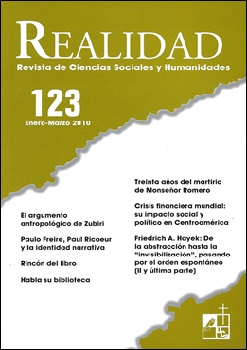Paulo Freire, Paul Ricoeur and the narrative identity
DOI:
https://doi.org/10.5377/realidad.v0i123.3317Keywords:
Identidad narrativaAbstract
In this paper a dialogue between two authors can be found: Paul Ricoeur and Paulo Freire. Its aim is to relate Ricoeur’s concept of narrative identity to the importance given by Freire to the fact of narrate our own history. The author reviews both the communicational dialogic educative model proposed by the Brazilian educator and the concepts of identity, concordance, discordance and narrative identity of the French philosopher. The dialogue established here between both authors makes it possible to study in depth other aspects: narrative identity in Latin America, plurality and alterity, the practical-transformer relation with the Other, resilience and relation between citizenry and narration. These elements make is possible to reflect on how we construct ourselves on narrations and the way we are hence the texts we narrate each other.
Downloads
1852
Downloads
Published
How to Cite
Issue
Section
License
© Realidad: Revista de Ciencias Sociales y Humanidades
Authors who publish in this journal accept the following conditions:
Realidad: Revista de Ciencias Sociales y Humanidades, provides open and immediate access to its content, based on the Open Access Policy of the Central American University "José Simeón Cañas"provides open and immediate access to its content.
According to the copyright legislation, Revista de Ciencias Sociales y Humanidades Journal published by the Universidad Centroamericana José Simeón Cañas, recognizes and respects the moral rights of the authors, as well as the ownership of the patrimonial right, which will be assigned to the journal for its diffusion in open access, in printed version and in digital format. By being part of multiple indexers, databases and reference systems, the articles published by Revista de Ciencias Sociales y Humanidades will be visible and available for downloading on these websites, indicating, in all cases, the authorship of the articles, the date of publication and the number of the journal to which they correspond.
You are free to:
- Share: copy and redistribute the material in any medium or format
- Adapt: remix, transform, and build upon the material
Under the following terms:
- Attribution: You must give appropriate credit, provide a link to the license, and indicate if changes were made. You may do so in any reasonable manner, but not in any way that suggests the licensor endorses you or your use.
- Non-Commercial: You may not use the material for commercial purposes.




